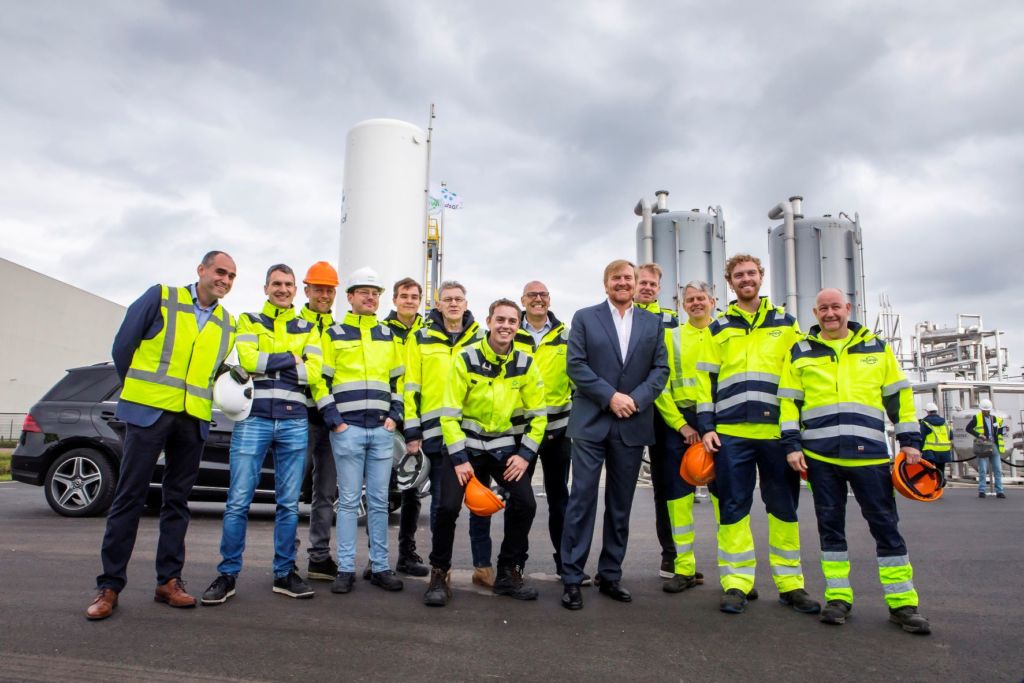Shell Ventures and Nordsol: a new approach to the waste-to-energy value chain
September 7, 2022
Shell Ventures invests in disruptive companies that have the capacity to impact the energy transition.
Nordsol is one of them. With its innovative technology to produce bio-LNG from biogas, made from organic waste, it fulfills a unique role in the waste-to-energy chain, together with strategic partners Renewi and Shell.
A strategic partnership covering the whole value chain
Across the Netherlands, Renewi collects organic waste, such as expired products, processes this waste and then converts it into biogas during its fermentation. Nordsol processes this biogas into bio-LNG at the Netherlands’ first bio-LNG plant. Finally, Shell sells this bio-LNG at its LNG filling stations in The Netherlands.

Inauguration of the 1st bio-LNG plant in The Netherlands
The support from Shell Ventures
The conception and maturation of any new technology makes for an arduous process. Progressing this development is why Shell’s corporate venture capital team acts as an investor and a partner to help commercialise innovative businesses, which is exactly what they did for Nordsol. Jermaine Saaltink, investment director at Shell Ventures, says, “We invest across the spectrum of early- and late-stage companies. With Nordsol, we trusted the team and saw the potential of their technology, which gave us the confidence to take on a more involved role.”
For Shell, Nordsol was a natural fit.
“Our downstream business was looking for bio-LNG,” says Saaltink, “so we were already a prospective customer. From a VC perspective, when investing in an early-stage company, it is super-useful to know there is a customer for the product you are looking to sell.”
An opportunity for growth
By the time Nordsol got acquainted with Shell Ventures, it was a four-man company. “We went straight into the next gear. Shell saw the opportunities for a long-term contract, which is not very common in our market. It was somewhat of a leap of faith,” Wouter Zijlmans, CEO of Nordsol explains. “Usually the only way to bring these kinds of technologies to life is to actually prove it works, because nobody is going to buy a drawing of a plant that doesn’t work in the real world. With an app, you can rent some server capacity to roll it out, the risks and investments are manageable. What we were looking to build was much harder. In an asset-rich environment it’s hard to surpass that initial hurdle of costs and risk.” However, with the right partners on board, the plant was commissioned in 2021 and since January 2022 has been in steady production. Zijlmans concludes, “for a bank to see that Shell has invested offers a level of comfort – a stamp of approval.”
For many, partnering with a behemoth such as Shell might be cause for hesitation. “And of course we considered this carefully,” says Zijlmans, “We want to be a green company and how credible are we with Shell as an investor? Will we lose partners? But we believed that it was the right step for our company – and the planet – to take the opportunity, grow rapidly, and have a potential business partner lined up.”
Plans for the future
But it doesn’t stop there, says Zijlmans, “Climate change doesn’t wait. We need to dramatically increase the number of plants and sites under development to make the envisioned impact. Major players like Shell can and should set the stage for that.”
“In order to accelerate the energy transition, we will need a mosaic of decarbonisation solutions,” agrees Saaltink. “There are too many experts trying to debate what the winner will be. And maybe there will be a winner over time, but in the near term, I don’t think we should have that endless discussion. Anything that enables us to manage emissions today, is a winner. Digital apps alone aren’t going to save the world.”
To learn more about Norsol, please check their website
To learn more about Shell Ventures, check here
Shell is a Diamond Sponsor at The Business Booster this year, meet them in Lisbon on 28-29 September 2022.
